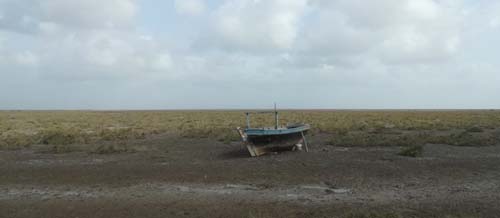Pakistan, China join hands to protect Indus Delta against climate change

China Economic Net
Beijing: Researchers from Pakistan and China are working together on the challenges and solutions for the sustainable development of the Indus Delta.
On the Progress Meeting of the UN Ocean Decade ‘Mega-Delta Programme’ hosted last month by the State Key Laboratory of Estuarine and Coastal Research (SKLEC), East China Normal University, scientists from Pakistan, China and several other countries shared their progress in research and announced that online archives on the scientific data for major river deltas will be set up to share with partners.
Known as the vertebra of Pakistan’s ecology and economy, the Indus Delta is the fifth largest in the world and home to the seventh biggest mangrove forest.
The complex system of swamps, mudflats, and streams are home to rice, cotton, and wheat plants, fish and prawn, mangrove forests, and wild animals, offering various sources of income to the inhabitants.
However, recent years has witnessed a sharp decrease in sand and water supply to the delta area.
A World Bank study shows that the sediment that reaches the delta has declined from an estimated 270 million tonnes per year at pre-development levels to 13 million tonnes in 2019.
The rising sea level and offshore storm surge have triggered beach erosion and salt-water encroachment, leading to the degradation and death of mangrove forests and decreased production of fish and shrimp.
The Third Pole, a platform dedicated to promoting information and discussion about the Himalayan watershed and the rivers that originate there, released that around 1.2 million people from the Indus Delta have already migrated to Karachi.
According to Dr. Samina Kidwai, Director of the National Institute of Oceanography, Pakistan, the challenges faced at the Indus River Delta include coastal erosion, mangrove degradation and decreased fishery production.
“Comprehensive management of water and sand resources in the entire drainage basin is required”, said Li Xiuzhen, Professor of Ecology and Deputy Director for International Affairs, State Key Laboratory of Estuarine and Coastal Research, East China Normal University, in an interview with China Economic Net (CEN).
The Mega-Delta Programme of UN Ocean Decade was initiated in June 2021 in response to the global issues plaguing the deltas around the world, such as reduced sediments and excessive nutrients inputs from the catchment, frequent storm surges from the sea, as well as land subsidence, reclamation and flooding.
According to Prof. He Qing, Director of the State Key Laboratory of Estuarine and Coastal Research, East China Normal University, it aims to understand the current status of global river deltas, explore the mechanisms of delta evolution under the influence of global climate change and human activities, predict future trends of water-sediment and socio-economic evolution, as well as early warning for hazards, and provide solutions for common problems, such as sea-level rise, coastal erosion, flood disasters, salt water intrusion, soil and water pollution, and ecosystem degradation.
“Collaboration among different disciplines and stakeholders is required to support sustainable development in delta regions, ” she said.
It is learned that in the future, collaboration will be conducted in the management of hazards and resources, carbon sequestration and micro-plastics, etc.





